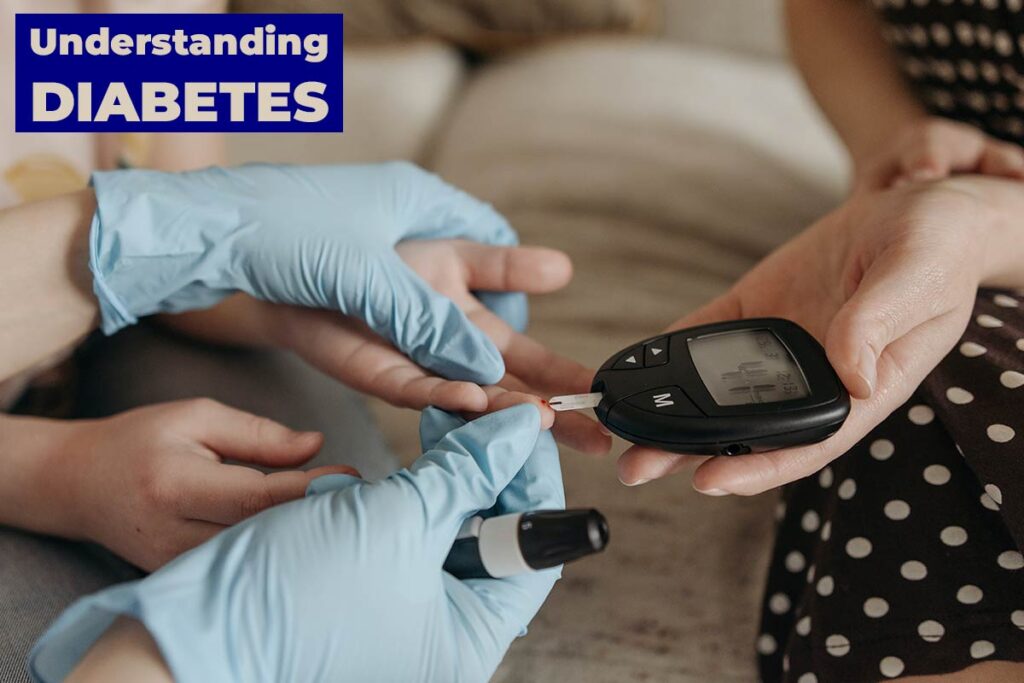
Diabetes
Diabetes is a chronic metabolic disorder affecting millions of people worldwide. It occurs when the body fails to regulate blood sugar levels properly.
This comprehensive article aims to provide a complete overview of diabetes, including its causes, symptoms, and effective management strategies.
By understanding this condition, individuals can make informed decisions about their health and take proactive steps towards prevention and control.
What is Diabetes?
Diabetes is a condition characterized by high blood sugar levels due to insufficient production or improper utilization of insulin, a hormone responsible for regulating glucose in the body.
Normally, when you eat food, your body breaks down the food into glucose, which is a form of sugar.
Insulin is a hormone that helps glucose get into your cells to be used for energy.
When you have diabetes, your body either doesn’t produce enough insulin or can’t use insulin properly.
As a result, glucose builds up in your blood instead of going into your cells.
Types of Diabetes
There are several types of diabetes, each with its own distinct characteristics and causes.
Understanding the different types is crucial for proper diagnosis and management. The three main types of diabetes are:
Type 1 Diabetes
Type 1 diabetes, also known as insulin-dependent diabetes or juvenile diabetes, typically develops in childhood or adolescence.
It occurs when the immune system mistakenly attacks and destroys the insulin-producing beta cells in the pancreas.
As a result, the body produces little to no insulin. People with type 1 diabetes require lifelong insulin therapy to regulate their blood sugar levels.
The exact cause of type 1 diabetes is still unknown, but genetic factors and environmental triggers, such as certain viral infections, may play a role.
Type 2 Diabetes
Type 2 diabetes is the most common form of diabetes, accounting for around 90% to 95% of all cases.
It usually develops in adulthood, although it is increasingly being diagnosed in children and adolescents due to rising obesity rates.
In type 2 diabetes, the body becomes resistant to the effects of insulin or fails to produce enough insulin to maintain normal blood sugar levels.
Lifestyle modifications, including a healthy diet, regular physical activity, weight management, and sometimes oral medications or insulin, are key components of managing type 2 diabetes.
Gestational Diabetes
Gestational diabetes occurs during pregnancy and affects approximately 2% to 10% of pregnant women who have not previously had diabetes.
Hormonal changes during pregnancy can lead to insulin resistance, resulting in high blood sugar levels.
It poses potential risks to the health of both the mother and the baby.
While gestational diabetes typically resolves after childbirth, it increases the risk of developing type 2 diabetes later in life for both the mother and the child.
Managing gestational diabetes involves monitoring blood sugar levels, following a balanced diet, engaging in regular physical activity, and sometimes using insulin therapy.
Causes and Risk Factors
The development of diabetes is influenced by a variety of factors. Understanding these causes and risk factors can provide valuable insights into the condition.
By recognizing these causes and risk factors, individuals can take proactive measures to reduce their risk of developing diabetes.
Type 1 diabetes is primarily attributed to a combination of genetic predispositions and environmental triggers.
Individuals with certain genetic markers have a higher susceptibility to developing type 1 diabetes.
However, the exact triggers that initiate the autoimmune response leading to the destruction of insulin-producing cells in the pancreas are still being studied.
Environmental factors, such as viral infections or exposure to certain toxins, are believed to contribute to the development of type 1 diabetes in genetically susceptible individuals.
Type 2 diabetes is closely linked to lifestyle factors and genetic predispositions.
Sedentary behavior, a lack of physical activity, and unhealthy eating habits can significantly increase the risk of developing type 2 diabetes.
Obesity, especially excess weight around the waist, is a prominent risk factor.
Additionally, having a family history of type 2 diabetes can heighten the likelihood of developing the condition, indicating a genetic component to its onset.
While genetics play a role, lifestyle choices and environmental factors have a substantial impact on the development of type 2 diabetes.
Hormonal changes during pregnancy contribute to the development of gestational diabetes.
The placenta produces hormones that can impair insulin action, leading to elevated blood sugar levels.
Women who are overweight, have a family history of diabetes, or have experienced gestational diabetes in previous pregnancies are at a higher risk of developing this condition.
Managing gestational diabetes through appropriate medical care and lifestyle adjustments is crucial to ensuring the well-being of both the mother and the baby.
Recognizing Diabetes Symptoms
Early detection of diabetes is vital for effective management and to prevent complications. Recognizing the common symptoms of diabetes is crucial to seeking timely medical attention. Some of the typical symptoms to be aware of include:
- frequent urination,
- excessive thirst,
- unexplained weight loss,
- increased hunger,
- fatigue,
- blurred vision ,
- slow wound healing,
- and recurrent infections.
Frequent Urination
People with diabetes often experience an increased need to urinate. This is because excess sugar in the bloodstream pulls fluid from tissues, leading to more frequent trips to the bathroom.
Excessive Thirst
Diabetes can cause excessive thirst as the body tries to compensate for the fluid loss through increased urination. Persistent feelings of thirst, even after drinking fluids, can be a sign of diabetes.
Unexplained Weight Loss
Unintentional weight loss can occur in individuals with undiagnosed or poorly controlled diabetes.
This happens because the body is unable to properly utilize glucose for energy, so it starts breaking down fat and muscle tissue for fuel.
Increased Hunger
Despite eating more, individuals with diabetes may experience increased hunger. This is because the body’s cells are not effectively receiving the energy they need, leading to persistent feelings of hunger.
Fatigue
Diabetes can cause fatigue and a general feeling of being tired.
Insufficient glucose utilization by the body’s cells can lead to a lack of energy and feelings of exhaustion.
Blurred Vision
High blood sugar levels can affect the lens of the eye, causing temporary changes in vision, such as blurred vision or difficulty focusing. Blurred vision may come and go as blood sugar levels fluctuate.
Slow Wound Healing
Diabetes can impair the body’s ability to heal wounds and injuries.
Even minor cuts or sores may take a longer time to heal due to poor circulation and compromised immune function.
Recurrent Infections
Diabetes can weaken the immune system, making individuals more susceptible to infections.
Common infections may include urinary tract infections, skin infections, yeast infections, and frequent bouts of gum disease.
If you experience any of these symptoms or have concerns about your health, it is essential to consult a healthcare professional for proper diagnosis and treatment.
Early detection, along with appropriate medical care, lifestyle modifications, and adherence to treatment plans, can significantly improve the management of diabetes and enhance overall well-being.
Complications Associated with Diabetes
Uncontrolled diabetes can lead to various complications affecting multiple organ systems.
Proper management of blood sugar levels and regular medical check-ups can help prevent or minimize these complications.
Complications arising from diabetes tend to develop gradually over time.
The duration of diabetes and the level of blood sugar control directly impact the risk of complications. In the long term, these complications can have disabling or life-threatening consequences.
It’s important to note that prediabetes can progress to type 2 diabetes. Some potential complications include:
- Cardiovascular diseases,
- Neuropathy (nerve damage),
- Nephropathy (kidney damage),
- Retinopathy (eye damage), and
- An increased risk of infection.
Cardiovascular Disease
Diabetes significantly increases the risk of various heart problems, including coronary artery disease with chest pain (angina), heart attack, stroke, and the narrowing of arteries (atherosclerosis).
Individuals with diabetes are more likely to develop heart disease or experience a stroke.
Diabetic Neuropathy
High blood sugar levels can damage the walls of small blood vessels (capillaries) that supply nourishment to the nerves, particularly in the legs.
This can result in tingling, numbness, burning sensations, or pain that usually initiates in the toes or fingers and gradually spreads upward.
Nerve damage related to digestion can lead to issues such as nausea, vomiting, diarrhea, constipation, and, in men, erectile dysfunction.
Diabetic Nephropathy
Diabetes can cause damage to the intricate filtering system of the kidneys, which consists of numerous tiny blood vessel clusters called glomeruli.
These glomeruli filter waste from the blood, and when they are compromised due to diabetes, kidney damage can occur.
Diabetic Retinopathy
The blood vessels in the eyes can be affected by diabetes, potentially leading to diabetic retinopathy.
This condition can cause damage to the eyes and, if left untreated, may result in vision loss or blindness.
Skin and Mouth Conditions
Diabetes can affect the skin in various ways.
The elevated blood sugar levels can create an environment conducive to bacterial and fungal growth, making individuals more susceptible to skin infections.
Common skin problems associated with diabetes include cellulitis, boils, fungal infections (such as candidiasis), and slow-healing wounds. Furthermore, diabetes can also impact oral health.
The high glucose levels in saliva can contribute to the growth of bacteria, increasing the risk of gum disease (periodontitis) and infections in the mouth.
Proper oral hygiene and regular dental check-ups are essential for maintaining oral health.
Hearing Impairment
Studies have indicated that hearing problems are more prevalent in people with diabetes compared to the general population.
The exact mechanisms behind this association are not fully understood, but it is believed that high blood sugar levels can damage the small blood vessels and nerves in the inner ear, leading to hearing loss.
Regular hearing screenings and appropriate management of diabetes can help address hearing-related issues.
Alzheimer’s Disease
Type 2 diabetes has been linked to an increased risk of developing dementia, including Alzheimer’s disease.
The underlying mechanisms connecting the two conditions are complex and not yet fully understood.
However, chronic high blood sugar levels, insulin resistance, and inflammation may contribute to the development and progression of Alzheimer’s disease.
Proper management of diabetes, including blood sugar control and a healthy lifestyle, may help reduce the risk of developing dementia.
Depression
Depression is a common comorbidity in individuals with both type 1 and type 2 diabetes.
The challenges of living with a chronic condition, the constant need for self-care, and the potential impact on quality of life can contribute to feelings of sadness, anxiety, and depression.
Moreover, the physiological changes associated with diabetes, such as imbalances in neurotransmitters and hormones, can also contribute to the development of depression.
It is important for individuals with diabetes to receive comprehensive care that addresses both their physical and mental well-being.
This may involve counseling, support groups, and, in some cases, medication.
To minimize the risk of these complications, it is crucial for individuals with diabetes to maintain optimal blood sugar control, adhere to their treatment plans, engage in regular medical check-ups, and make appropriate lifestyle adjustments. Collaborating closely with healthcare professionals is vital to managing diabetes and preventing or mitigating the impact of complications.
Diabetes Management Strategies
Managing diabetes involves a multifaceted approach that includes lifestyle modifications, medication, and regular monitoring tailored to individual needs.
Since diabetes affects each person differently, management plans are personalized.
However, by incorporating diabetes management strategies into daily life and working closely with healthcare professionals, individuals with diabetes can effectively manage the condition and reduce the risk of complications.
Below are the five main aspects of diabetes management:
Blood Sugar Monitoring
Regular monitoring of blood sugar levels is crucial for assessing the effectiveness of the treatment plan.
This involves frequent checks using a glucose meter and finger stick, or through continuous glucose monitoring (CGM).
The target blood sugar range will be determined in consultation with a healthcare provider.
This activity offers valuable insights for diabetes management, aiding individuals in making informed decisions about medication, diet, and exercise.
Medications and Insulin Therapy
Some individuals with diabetes may require oral medications or insulin injections to regulate blood sugar levels.
Specifically, oral diabetes medications are prescribed for individuals with type 2 diabetes or prediabetes who still produce some insulin.
These medications help regulate blood sugar levels. Metformin is the most commonly prescribed oral medication.
People with gestational diabetes may also require oral medication.
For individuals with type 1 diabetes or some cases of type 2 diabetes, synthetic insulin is necessary.
Insulin can be administered through injections using syringes, insulin pens, insulin pumps, or rapid-acting inhaled insulin.
The choice of insulin type and delivery method depends on individual needs.
It is important to follow prescribed treatment plans and consult healthcare professionals regularly.
Healthy Eating and Diet
Managing diabetes involves careful meal planning and adopting a healthy diet.
Food choices have a significant impact on blood sugar levels.
For those taking insulin, counting carbohydrates is essential, as it determines the required insulin dosage during meals.
Following a balanced diet rich in fruits, vegetables, whole grains, lean proteins, and healthy fats is essential.
Limiting sugary foods and beverages and controlling portion sizes is crucial for blood sugar control.
Note that following a nutritious eating plan not only helps manage blood sugar but also supports weight management and reduces the risk of heart disease.
Regular Physical Activity (Exercise)
Regular physical activity is an integral part of diabetes management for everyone with the condition.
Exercise improves insulin sensitivity and helps reduce insulin resistance.
Engaging in physical activity on a consistent basis contributes to better blood sugar control (lower blood sugar levels) and overall well-being.
Aim for at least 150 minutes of moderate-intensity aerobic activity per week, along with strength-training exercises.
Stress and Weight Management
Stress can affect blood sugar levels.
Employing stress management techniques such as meditation, deep breathing exercises, and engaging in hobbies can help maintain emotional well-being and blood sugar control.
Additionally, maintaining a healthy weight, blood pressure, and cholesterol levels is crucial due to the increased risk of heart disease associated with diabetes.
Final Note
Diabetes is a prevalent chronic condition that requires lifelong management. There are three main types of diabetes: type 1, type 2, and gestational diabetes. Type 1 diabetes occurs when the immune system mistakenly attacks and destroys insulin-producing cells in the pancreas.
Type 2 diabetes occurs when the body becomes resistant to insulin or fails to produce enough insulin.
Gestational diabetes develops during pregnancy and usually resolves after childbirth.
By understanding the causes, recognizing symptoms, and implementing effective management strategies, individuals can lead fulfilling lives while minimizing the risk of complications.
Proper education, regular medical check-ups, and adherence to a healthy lifestyle are vital to successfully managing diabetes.
With the right support and self-care practices, individuals with diabetes can achieve optimal health and well-being.
Emphasizing a healthy lifestyle, maintaining a balanced weight, and being aware of family history can contribute to the prevention or effective management of the condition.
Regular medical check-ups and consultations with healthcare professionals are essential for early detection and intervention, promoting optimal health and well-being.
DISCLAIMER:
The information provided in this article is meant for general informational purposes only and does not take into account your specific circumstances. It should not be considered as a replacement for professional assistance or advice. You should not solely rely on the information presented in this article when making decisions. Any action taken based on the information in this article is done so at your own risk and responsibility.







